 Spain Without Spanish – Joseph Green
Spain Without Spanish – Joseph Green
“The Sagrada Familia in Barcelona, Spain was designed by architect Antoni Gaudi in 1882. It stands fifty feet tall at its tallest point, the central spire of Jesus Christ. The Sagrada Familia is also covered in some of the most beautiful carvings one would ever hope to see,” said the short, pale woman leading the tour. “Blah. Blah. Blah,” is all I heard through the roaring crowd of sweaty tourists craning to get a glimpse of the cathedral. Now that was all good and well, but by the time I looked upon the face of that beautiful cathedral, I had been awake for well over forty-eight hours. I looked at my friends, and by the look on their jet-lagged faces, I knew they shared my grief. Don’t get me wrong the cathedral was absolutely stunning! I had never seen something so beautiful in my life, but at this point all I wanted was lunch. What was the best part? I had no idea how to order lunch. I, regretfully, did not think Spanish was important to learn in high school. Now I am in Spain with a horde of grumpy tourists and no way to communicate.
In 2012 I was given the privilege of choosing a destination of my choice for my senior trip. My family, being avid Disney vacationers, gave me no other choice but to choose a destination provided by Disney. My mother read me a list of possible cruise destinations for 2013, and after a little consideration I chose a seven-day cruise through the Mediterranean. The cruise departed from Barcelona, Spain and included stops in France and Italy. My mother had taken French in high school and college and spoke it well enough to get by. Mom had also recently started teaching herself Italian in preparation for the cruise. It seemed as though my trip would turn out to be quite lovely! We would fly from Atlanta to Barcelona, hardly having to wait at the airport, and board the ship promptly. That is until my parents made the choice to spend two days in
My family, being avid Disney vacationers, gave me no other choice but to choose a destination provided by Disney. My mother read me a list of possible cruise destinations for 2013, and after a little consideration I chose a seven-day cruise through the Mediterranean. The cruise departed from Barcelona, Spain and included stops in France and Italy. My mother had taken French in high school and college and spoke it well enough to get by. Mom had also recently started teaching herself Italian in preparation for the cruise. It seemed as though my trip would turn out to be quite lovely! We would fly from Atlanta to Barcelona, hardly having to wait at the airport, and board the ship promptly. That is until my parents made the choice to spend two days in 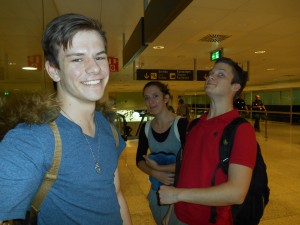 Barcelona to do some sightseeing. No one in my family spoke, or had taken any classes that taught the Spanish language, except for me. So who do you think they expected to communicate to the locals in Spain? You guessed it, me.
Barcelona to do some sightseeing. No one in my family spoke, or had taken any classes that taught the Spanish language, except for me. So who do you think they expected to communicate to the locals in Spain? You guessed it, me.
Bill Gates once said, “I give the most difficult jobs to the laziest people because I know they will find the simplest way to complete them.” Although I passed Spanish with an A, the online program teaching us had a slightly faulty teaching design. The “lazy people,” or as we called them, “gifted slackers,” found a way to complete the percentage of work we were asked to complete without doing any work at all. If one were to log on to this program and choose a speaking assignment without plugging in a microphone, one would find that the program itself would complete their work. Nearly the entire 2013 graduating class of Riverfield Academy passed Spanish I and Spanish II by doing absolutely nothing. We thought we were so smart. Unbeknownst to my parents, I could not speak one bit of Spanish. Unbeknownst to me, at the time, I was actually going to need to speak Spanish.
August of 2013 finally came. After months of preparations, and constant haggling, courtesy of my mother, we were on our way. Approximately eleven hours and roughly 25,000 miles later, we landed in Barcelona. Early morning Barcelona was stunning from the airplane window. An orange and pink sunrise cast over the mountains broke through crests and painted the seaside city. I couldn’t wait to step foot on the ground, and experience the view firsthand. Sadly, my excitement was diminished by the hours of airport hell I had to endure. We had planned on seeing the Sagrada Familia as early as possible in a hope to avoid the crowds, but it was already 11:00 and we hadn’t even checked into the hotel.
my mother, we were on our way. Approximately eleven hours and roughly 25,000 miles later, we landed in Barcelona. Early morning Barcelona was stunning from the airplane window. An orange and pink sunrise cast over the mountains broke through crests and painted the seaside city. I couldn’t wait to step foot on the ground, and experience the view firsthand. Sadly, my excitement was diminished by the hours of airport hell I had to endure. We had planned on seeing the Sagrada Familia as early as possible in a hope to avoid the crowds, but it was already 11:00 and we hadn’t even checked into the hotel.
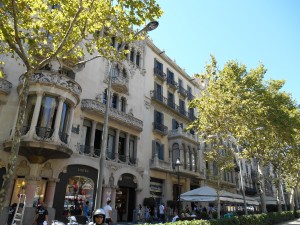 After a short break in my hotel room, I met my family in the hall and we decided to walk to the Cathedral. I enjoyed seeing the historic city during the walk; the pastel buildings with intricate balconies and moldings. It felt good to stand after such a long flight. As we wove our way through mazes of crowds, the smell of pastries and pastas filled the air. The tempting smells would mean my demise. Sure enough, as we approached the cathedral, my only thought was, “food.” Apparently my family felt the same because after our tour it was my time to shine. My mother turned to me and said, “I’m hungry. Everyone else is hungry. Let’s get something to eat!” My stomach dropped. They were all expecting me to order, and I did not know how.
After a short break in my hotel room, I met my family in the hall and we decided to walk to the Cathedral. I enjoyed seeing the historic city during the walk; the pastel buildings with intricate balconies and moldings. It felt good to stand after such a long flight. As we wove our way through mazes of crowds, the smell of pastries and pastas filled the air. The tempting smells would mean my demise. Sure enough, as we approached the cathedral, my only thought was, “food.” Apparently my family felt the same because after our tour it was my time to shine. My mother turned to me and said, “I’m hungry. Everyone else is hungry. Let’s get something to eat!” My stomach dropped. They were all expecting me to order, and I did not know how.
We walked back toward the hotel. Along the way, my mother or father would ask, “What 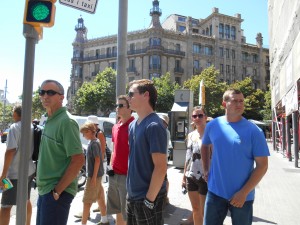 about here? This place looks good.” I would respond with, “It doesn’t matter to me. I’m fine with anything.” That bought me time. The group, being too tired and grumpy to come to a consensus, would not choose a restaurant to eat. This did not bother me at all! The more time we killed arguing about food, the more time I got to hide the fact that I didn’t know how to speak Spanish. After an hour of listening to my stomach growl and seeing food pass right before my eyes, not even I could handle it. It was time to man-up and deal with situation at hand! Though running and hiding seemed rather appealing as well.
about here? This place looks good.” I would respond with, “It doesn’t matter to me. I’m fine with anything.” That bought me time. The group, being too tired and grumpy to come to a consensus, would not choose a restaurant to eat. This did not bother me at all! The more time we killed arguing about food, the more time I got to hide the fact that I didn’t know how to speak Spanish. After an hour of listening to my stomach growl and seeing food pass right before my eyes, not even I could handle it. It was time to man-up and deal with situation at hand! Though running and hiding seemed rather appealing as well.
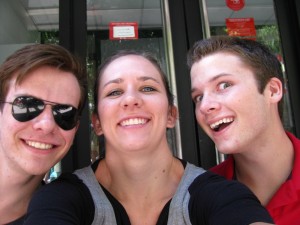 We sat down outside of a corner-side restaurant. Locals walked in and out carrying food, their faces satisfied with their order. I looked at my family. They were sweaty and worn out from walking. I knew they must be starving. As I stood there, feeling regret for not taking Spanish more seriously, a thought crossed my mind. “What if, instead of telling my parents I couldn’t order food, I do what I’m supposed to do? Ask this guy if he speaks English!” A burst of energy flowed through me. If the man working the counter spoke English, there would be no need for my family to know that I don’t know Spanish. If he didn’t, not only would I embarrass myself in front of the locals, but I would also have to explain to my family that I couldn’t communicate with anyone. I balled my fists, swallowed what little pride I had left, and marched into the restaurant.
We sat down outside of a corner-side restaurant. Locals walked in and out carrying food, their faces satisfied with their order. I looked at my family. They were sweaty and worn out from walking. I knew they must be starving. As I stood there, feeling regret for not taking Spanish more seriously, a thought crossed my mind. “What if, instead of telling my parents I couldn’t order food, I do what I’m supposed to do? Ask this guy if he speaks English!” A burst of energy flowed through me. If the man working the counter spoke English, there would be no need for my family to know that I don’t know Spanish. If he didn’t, not only would I embarrass myself in front of the locals, but I would also have to explain to my family that I couldn’t communicate with anyone. I balled my fists, swallowed what little pride I had left, and marched into the restaurant.
The man working the counter looked at me and said, “hola.” I immediately felt stupid and 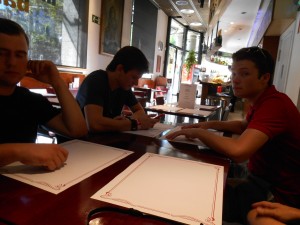 intimidated as I muttered, “hola,” back to him. Nervously, I looked him in the eye and said, “Engles?” He responded, “Engles? Si!” I buried my face in my hands and thought, “Oh, God. If this guy really spoke English he would’ve said yes, not si!” My thoughts were interrupted when the man corrected himself to say, “Ah! I mean yes!” Upon hearing those words, my jaw dropped. Relief flowed over me in the form of a tall, tan Spanish worker with a strange accent. I smiled and said, “I’ll be right back. I’m going to get my family.”
intimidated as I muttered, “hola,” back to him. Nervously, I looked him in the eye and said, “Engles?” He responded, “Engles? Si!” I buried my face in my hands and thought, “Oh, God. If this guy really spoke English he would’ve said yes, not si!” My thoughts were interrupted when the man corrected himself to say, “Ah! I mean yes!” Upon hearing those words, my jaw dropped. Relief flowed over me in the form of a tall, tan Spanish worker with a strange accent. I smiled and said, “I’ll be right back. I’m going to get my family.”
Through lunch I contemplated my actions. I may not have taken the best approach by not 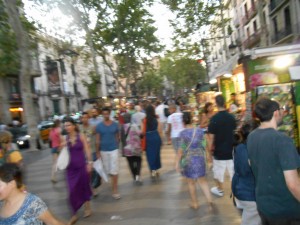 telling my parents I didn’t know Spanish, but I realized something. I could navigate this city if I needed to. I could be an ordinary, adult, American tourist. Simply asking that man if he spoke English gave me the confidence I needed to speak with others. In that moment, I realized that I had become literate in the subject of tourism.
telling my parents I didn’t know Spanish, but I realized something. I could navigate this city if I needed to. I could be an ordinary, adult, American tourist. Simply asking that man if he spoke English gave me the confidence I needed to speak with others. In that moment, I realized that I had become literate in the subject of tourism.

Great post, Joseph! Our family is taking a trip to Puerto Rico in November. We’ll be relying on our oldest son to help us communicate, since he has taken two years of Spanish so far. Now I’m wondering if I should download a translation app 🙂